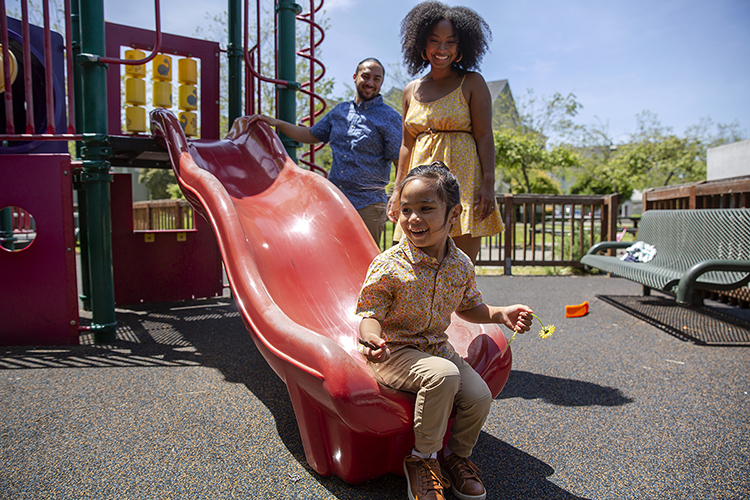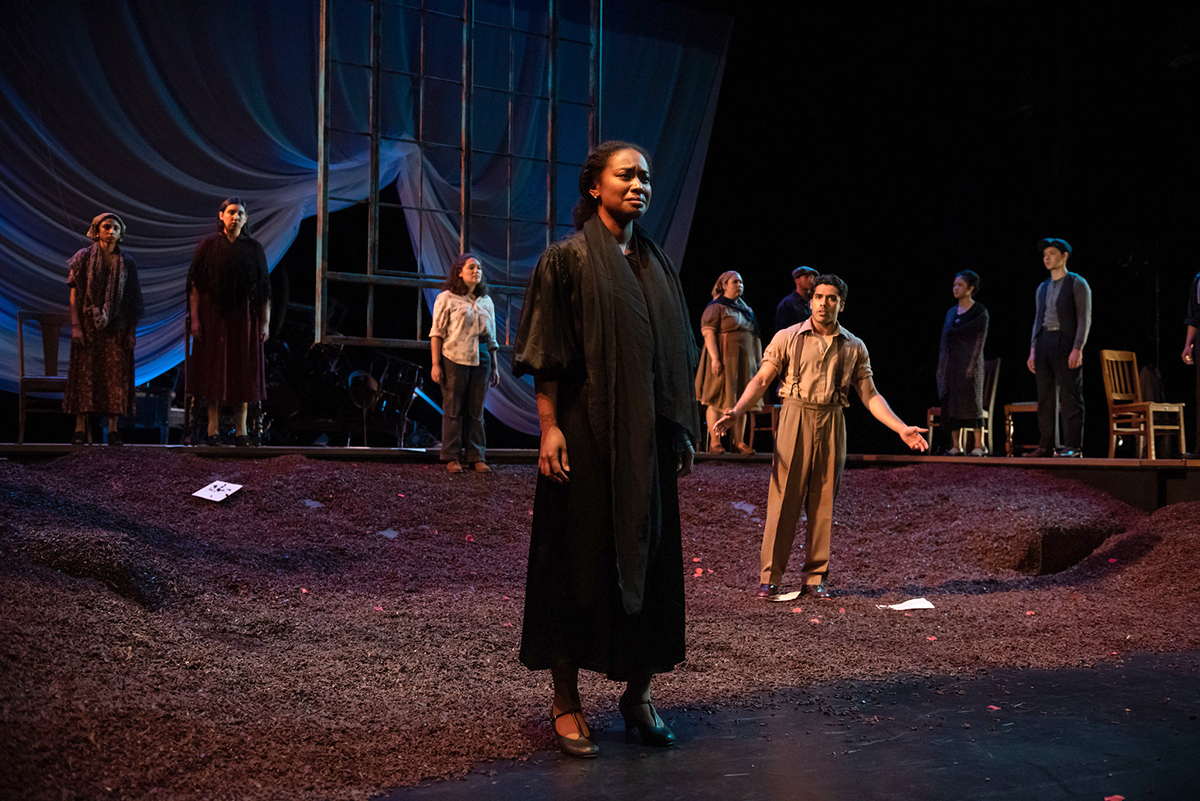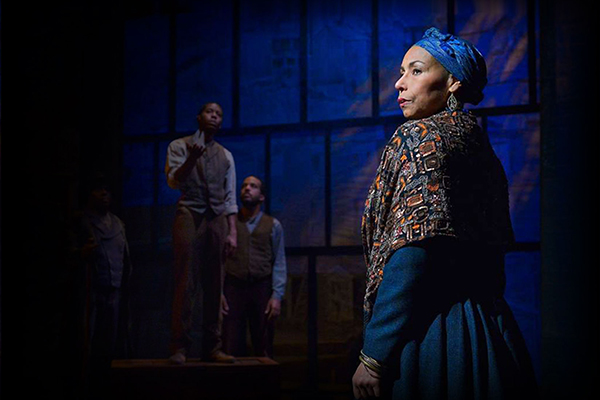For Anna Sharpe, a theater degree means her son sees her pursuing her dream
When fourth-year student Sharpe first got to UC Berkeley in 2017, she was an art history major and struggling with postpartum depression. After she realized her passion for acting, everything fell into place.

May 11, 2021

When Anna Sharpe, who’s graduating with a double major in theater, dance and performance studies, first got to UC Berkeley in 2017, she was an art history major and struggling with postpartum depression after giving birth to her son, Lucian, several months before. After she realized her passion for theater, her depression slowly lifted and things began to fall into place. (UC Berkeley photo by Brittany Hosea-Small)
Anna Sharpe has never done something because it was easy. Quite the opposite. If it’s hard — if it’ll take all she’s got, if it’ll leave her in pieces, she’s interested. Because it shows that it means something. That it matters.
When Sharpe first arrived at UC Berkeley as an undergraduate student in 2017, she didn’t know that she wanted to be an actor — that being on stage would help pull her out of the postpartum depression she’d been experiencing since giving birth to her son several months before. But after taking a theater class to lighten her rigorous art history class load, she fell in love.
“I just felt pulled to theater, more and more,” said Sharpe. “I was really questioning why I was afraid to take the leap. I was thinking a lot about my dad and just how common it is for families of color to want their children to do something that is safe, you know, where there’s going to be a return. But, obviously, I wasn’t going to be a STEM major, so I just decided to go ahead and do it. Nothing terrifies me and excites me at the same time more than acting.”
Sharpe, a double major in theater, dance and performance studies, will deliver the undergraduate speech at her department’s virtual graduation ceremony on Monday, May 17, in which she aims to offer hope for this year’s graduating class — one that has “overcome a tumultuous college career, spanning so many unusual circumstances.”

Sharpe was selected to give the undergraduate speech at her department’s virtual graduation ceremony on Monday, May 17, in which she aims to offer hope for this year’s graduating class — one that has “overcome a tumultuous college career, spanning so many unusual circumstances.” (UC Berkeley photo by Brittany Hosea-Small)
Sharpe grew up living in military housing — her dad, Ivory, was in the Navy — so, she and her older sister, Angie, moved a lot. Although she was able to easily adapt to new schools and make new friends, it left her feeling unsure about herself and her opinions. “I think I was always in this middle space, where I played it safe. I sort of felt like I was putting on a character. I feel like it did take me a while to get an understanding of who I was and what I stood for.”

As a child, Sharpe and her older sister, Angie, moved a lot with their father, Ivory, who was in the Navy. “I was a military brat,” she said. Although Sharpe could easily adapt to new schools and friends, it left her feeling unsure about her own opinions. (Photos courtesy of Anna Sharpe)
After she graduated from Temecula Valley High School in Southern California, she began working at Bank of America and attending community college classes during her lunch breaks, returning late with permission. When she first visited Berkeley in 2014, for her sister’s commencement ceremony, she realized she could see herself living in the Bay Area. It was also when she reconnected with Quinn — the younger brother of her sister’s wife — whom she’d known since she was in eighth grade.
“He always told my sister, ‘Tell your sister I’m going to marry her one day.’ He’s younger than I am, and I was in a relationship for quite a while, but when we saw each other again at Berkeley, I was like, ‘And here we are. The plot thickens.’”
In 2016, they got married. “So, everyone’s like, ‘We really need to make it last — we’re double tied to the in-laws,’” she said, laughing.
After applying twice to Berkeley, she got in, and she and her family — Quinn and her son, Lucian, who was 10 months old at the time — moved from Temecula to Albany, where they live in student housing at University Village.

In May 2019, Sharpe was cast as Férula in The House of the Spirits, written by Cardid Svich and directed by Michael Moran, and based on a novel by Isabel Allende. It was the first time her dad had seen her on stage. “He is my No. 1 fan,” she said. (Photo by Natalia Perez)
At Berkeley, Sharpe was first cast as Férula in The House of the Spirits, based on a 1982 novel by Isabel Allende, which tells the story of a family that spans three generations and a century of violent change in an unnamed Latin American country. Sharpe invited her whole family to see her performance.
“My dad was just so proud of me,” she said. “It was a really emotional moment for me because it felt like such a risk. But I figured, ‘This is what I’m passionate about. This is what my son sees me being passionate about.’ When I was young, I had to grow up really quickly — I feel like a lot of Black girls do, honestly. And it was nice to have the opportunity to let go of those inhibitions and to feel like a kid again and to be able to play. My dad was like, ‘OK, baby, keep up the good work.’ He is my No. 1 fan.”

Margo Hall, a lecturer in the Department of Theater, Dance and Performance Studies, as Aunt Ester in Gem of the Ocean. “Acting is showing up and doing something to the other person you’re in a scene with in an authentic, real way,” she said. “Anna has such a big heart. She does everything: She’s directing, she’s acting, she’s writing. She’s embracing the life of an artist.” (Photo by Kevin Berne)
Although she felt empowered on stage, Sharpe also felt inexperienced and like she had to catch up with the other Berkeley student actors, many of whom had been acting since they were children. But over time, she realized she did have experience.
“I was like, ‘Anna, you have 33 years of life experience.’ Acting is life, is living. And I don’t know why it took me so long to realize that. I have very different textures from your traditional college student.”
“I recognized her trepidation early on in her performances,” said Margo Hall, a longtime Bay Area actor and lecturer in the Department of Theater, Dance and Performance Studies who has been an important mentor to Sharpe. “I encouraged her to trust herself and to trust that she can be big on stage. It’s about trusting that you are supposed to be in the space. I’ve seen her journey and her confidence grow. If you have life experiences, and you come at something with an empathetic heart, and you understand the power of storytelling — that’s what acting is. And Anna has such a big heart.”
And, Hall says, acting requires a lot of bravery, allowing yourself to be fierce and give yourself fully to a character. For Sharpe, who is drawn to playing characters who have endured trauma, acting has allowed her to dig deep within herself and embody raw, gritty moments that aren’t meant to be pretty. “Life happens to them,” she said. “It happens to them. It can be very draining playing these characters, but I think, ‘If I don’t tell these stories, then who will?’”

Sharpe (center) as herself in Unstable Connection, a devised virtual performance project written by a cast of eight students about what it meant to be a student in 2020. (Photo courtesy of Anna Sharpe)
At the end of the fall 2020 semester, Sharpe played herself in Unstable Connection, a devised virtual performance project written by a cast of eight students and directed by Hall, about what it meant to be a student in 2020. They explored three subjects: Black Lives Matter, COVID-19 and undocumented immigrants. Then, the cast dove into researching each issue and gave their performance over Zoom — the first time Sharpe had performed in a virtual space, which she said presents an extra challenge.
“These subjects were heavy, especially when we were talking about Black Lives Matter and reading the names of the people who had just died over the summer,” she said. “We weren’t able to leave the theater and leave our costumes behind to go home to a safe space, because that space is this space. I’ve had to find more exit strategies — running outside helps.”
For the past two years, Sharpe has been the president of Colors of Theatre, a student-led organization dedicated to encouraging and creating opportunities for people of color in the theater world. This semester, she directed her first play — Las Parajitas — by Bay Area playwright Jordan Ramirez Puckett about three generations of Chicana women who live in the same apartment together. It was a collaboration between Colors of Theatre and BareStage Productions.
“I am really drawn to work that reflects the times,” said Sharpe. “And I think that’s why I like new plays a lot. These new playwrights are willing to go places that feel a little unsafe. It’s uncharted territory, and they’re unapologetic about it.”

“Nothing terrifies me and excites me at the same time more than acting,” said Sharpe. “I am really drawn to work that reflects the times.” (UC Berkeley photo by Brittany Hosea-Small)
And Sharpe was recently in [hieroglyph], a play written by Erika Dickerson-Despenza and directed by Hall, presented by the San Francisco Playhouse and Lorraine Hansberry Theatre, for which Hall is the new artistic director. Being on stage again with other actors, said Sharpe, if still at a distance, felt like she was home. “I just had to take a moment,” she said. “It was just really emotional. I really treated the moment as if it were sacred to be in that space. I breathed it in and just sort of reveled in it. It was so great.”
After Sharpe graduates, she plans to pursue a career in TV and film, although she said she’s open to applying to graduate school next year if it feels right. And, she added, she could never have realized her dream to become an actor without the support of Quinn, who switched his work schedule to work the graveyard shift so that she could go to classes and attend rehearsals while he watched Lucian, now age 4.
“It’s so important to have a partner who really believes in you in this kind of work,” she said. “I really don’t think I could have done this without his support.”
